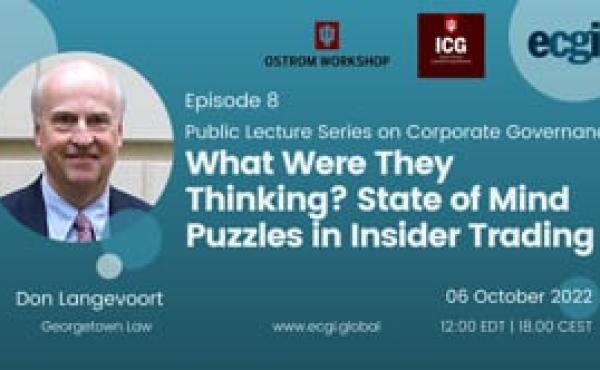
"What Were They Thinking? State of Mind Puzzles in Insider Trading"
** Please scroll down to watch the video **
The Institute for Corporate Governance Public Lecture Series:
"What Were They Thinking? State of Mind Puzzles in Insider Trading"
Don Langevoort (Georgetown Law)
Thursday, 6 October 2022
12:00 – 13:15 EDT | 18:00 – 19:15 CEST
Organised by
Jun Yang (Kelley School of Business, Indiana University)
About the Event:
The eighth lecture in this series was given by Professor Don Langevoort (Georgetown Law).
“What were they thinking?” is a question that can be posed two different ways as to the law of insider trading. One is doctrinal. State of mind plays a key role in deciding insider trading cases. But courts are confused as to what must go through the trader or tipper’s mind for the trading to be unlawful. The confusion has to do with the distinctiveness of insider trading from other forms of securities fraud involving false publicity or face-to-face deceit, which makes some sense. As many have pointed out, the kind of deception we look for in conventional fraud cases simply cannot be found in insider trading. We will try to solve some of the puzzles in that light.
But there is another, more exasperated reason to ask the “what were they thinking” question, besides assessing guilt or innocence. As a practical matter, given the state of insider trading law and potential penalties for violation, why do people risk the penalties in the first place? The evidence is that the volume of trading in advance of the release of material nonpublic information is considerable, some of which is surely unlawful. Of course, traders may be making a cold calculation based on little likelihood of detection, but so many cases seem to fail even the rational basis test for taking the chance. Interviews and testimonies by insider traders themselves often suggest how easy it is to rationalize the taking of trading or tipping opportunities in the moment of temptation, so that the risk of sanction and perception of wrongfulness exit from consciousness altogether or are shaded to near-nothing. These are cries for understanding, if not exculpation.
Don Langevoort is the Thomas Aquinas Reynolds Professor of Law at Georgetown Law. Prior to joining the Law Center faculty in 1999, Professor Langevoort was the Lee S. and Charles A. Speir Professor at Vanderbilt University School of Law, where he joined the faculty in 1981. The courses Professor Langevoort teaches are Contracts, Securities Regulation, various seminars on corporate and securities issues, and Corporations. Professor Langevoort has received the the Frank Flegal Teaching Award at Georgetown and the Paul J. Hartman Award for Excellence in Teaching at Vanderbilt. He has been a visiting professor at Harvard Law School and the University of Michigan Law School and a lecturer at the Washington College of Law, American University. After practicing for two years at Wilmer, Cutler & Pickering in Washington, D.C., he joined the staff of the U.S. Securities & Exchange Commission as Special Counsel in the Office of the General Counsel. Professor Langevoort is the co-author, with Professors James Cox and Robert Hillman, of Securities Regulation: Cases and Materials (Aspen Law & Business), and the author of a treatise entitled Insider Trading: Regulation, Enforcement and Prevention (West Group). He has also written many law review articles, a number of which seek to incorporate insights from social psychology and behavioral economics into the study of corporate and securities law and legal ethics. Professor Langevoort has testified numerous times before Congressional committees on issues relating to insider trading and securities litigation reform.
The public lecture series is organised by Institute for Corporate Governance (ICG), in partnership with the Ostrom Workshop at Indiana University and ECGI.
Programme
Welcome and Introduction
Speaker(s)
Q&A and Concluding Remarks
Speaker(s)
Speakers
Todd Haugh
Presentations
Contact







